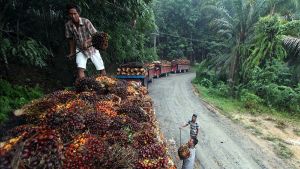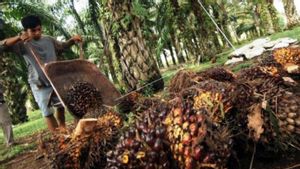JAKARTA - Indonesia is the central point of the factors that determine the price of world vegetable oil.
This was conveyed by the Director of Godrej International Dorab Mistry at the Indonesia Palm Oil Conference (IPOC) 2023 in Bali, Saturday 4 November. "Indonesia's palm oil production, which is the world's largest palm exporter, coupled with the threat of El Nino's impact, so that Indonesia's reaction to market conditions becomes very important," said Dorab Mistry as reported by Antara. He explained, macrosically, the price of vegetable oil for 2024 was influenced by the development of the Federal Reserve System (The Fed) interest rate, the condition of the possible recession in 2024, the end of the war in Ukraine and Gaza, and the development of the US dollar price. But on the other hand, according to him, the amount of vegetable oil supply in the middle of El Nino, the mandatory biofuel in Indonesia and other countries like Brazil, as well as the considerations of the US Presidential candidates for larger subsidies for biofuels will greatly determine the magnitude of global vegetable oil needs. Global vegetable oil researchers from Oil World Thomas Mielke said that global palm oil production is predicted to decline over the next 10 years with an average of only 1.7 million tons per year until 2030. In contrast to previous conditions, namely the 2010 to 2020 period, where the average production increase reached 2.9 million tons. Meanwhile, Thomas said, the consumption of global vegetable oil over the past 10 years continued to increase significantly, especially for food, energy and autochemist needs. With this existing estimate, it is estimated that a global production deficit will occur in 2024, it is predicted that there will be an increase in vegetable oil prices,' he said.
Meanwhile, he said, Indonesian palm oil has contributed 54 percent of the world's exports, but the decline in coconut production has made the competitiveness of vegetable oil in the global market worsening. He predicts that the decline in exports will still occur over the next two years in line with Indonesia's decline in palm oil production. Thomas explained that as much as 20 percent of the world's oils and fats need is used for the renewable energy sector, such as biodiesel and the rest is used to meet food needs and others. Biodiesel production in 2023 increased by 57 million tons and 10.5 million tons of which is Indonesian biodiesel production.
VOIR éGALEMENT:
"The increase in yield per hectare in the midst of land constraints due to moratorium policies must be carried out immediately if Indonesia continues to be the largest producer and exporter of palm oil in the world," he said. In line with this, the CEO and Founder of Transgraph Nagaraj Meda said the increase in consumption of the vegetable oil industry is globally driven by the United States and Indonesia., "he said that the Indonesian government must rethink the B40 implementation plan in the midst of declining production trends, and focus more on funding oil palm oil plantation replanting programs to increase national production.
The English, Chinese, Japanese, Arabic, and French versions are automatically generated by the AI. So there may still be inaccuracies in translating, please always see Indonesian as our main language. (system supported by DigitalSiber.id)
















